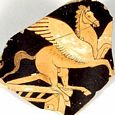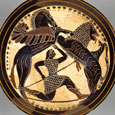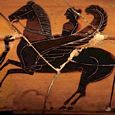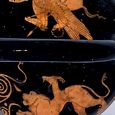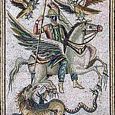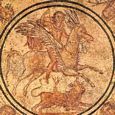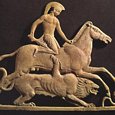BELLEROPHONTES
Greek Name
Βελλεροφοντης
Βελλεροφων
Transliteration
Bellerophontês
Bellerophôn
Latin Spelling
Bellerophontes
Bellerophon
Translation
Slayer of Belleros,
Wielder of Missiles
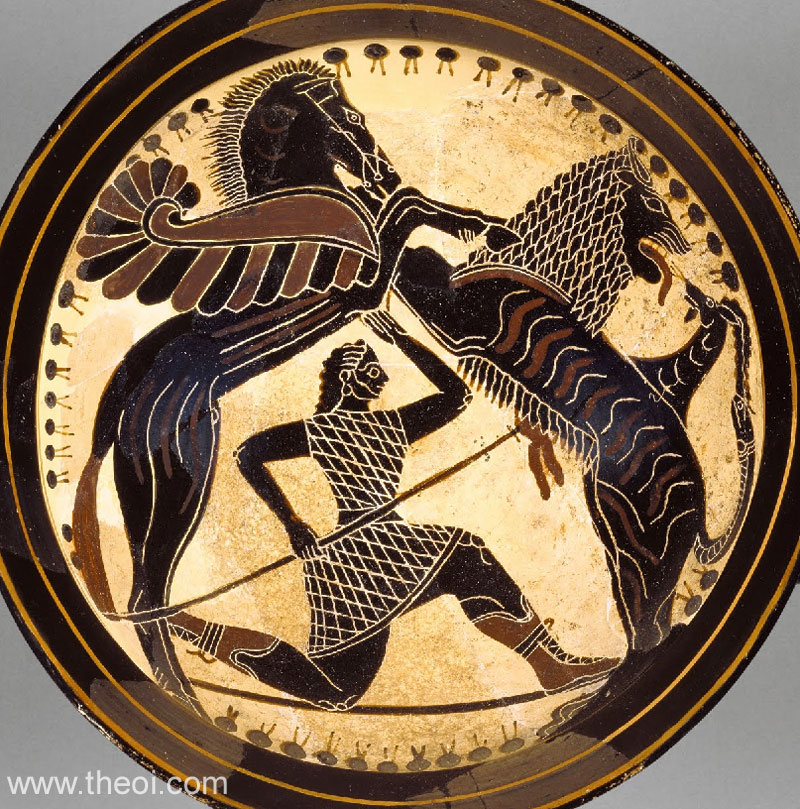
BELLEROPHONTES (Bellerophon) was one of the most celebrated heroes of myth. He was a son of the god Poseidon and Eurynome, wife of King Glaukos (Glaucus) of Korinthos (Corinth). In his youth Bellerophontes captured the winged horse Pegasos as it came to drink from the town's fountain.
He was later exiled for the murder of a family member and journeyed to the court of King Proitos (Proetus) in Argos for purification. The queen, however, developed a lust for the hero and when he spurned her, she told her husband he had tried to violate her.
Proitos then sent him off to King Iobates in Lykia (Lycia) with a closed letter requesting the youth be put to death. Iobates was reluctant to do this himself and so commanded Bellerophontes to slay the fire-breathing Khimaira (Chimera) which was ravaging the land. He rode into battle against the beast on the back of Pegasos and slew it by driving a lead-tipped spear into its fiery gullet.
The king then ordered him to subdue the barbarous Solymoi tribe, and later the Amazones, but again he proved victorious. Finally, Iobates commanded his guards to ambush and kill the youth, but he slew them all. The king was forced to acknowledge that Bellerophontes must be the son of a god and welcomed him into his house as his son-in-law and heir.
Despite all of his successes, Bellerophontes was still not satisfied and sought to ascend to heaven on the back of Pegasos. Zeus was angered by his presumption and sent a gadfly to sting the horse, causing it to buck and cast the hero back down to earth. After this he wandered the world alone, despised by both gods and men.
The mythological etymology of Bellerophontes name was "Slayer of Belleros" from the Greek Belleros and phonos. However, it is likely that the name originally meant "Wielder of Missiles" from the Greek words belos and phoreô.
FAMILY OF BELLEROPHON
PARENTS
[1.1] GLAUKOS (Homer Iliad 6.154, Hyginus Astronomica 2.21)
[1.2] GLAUKOS & EURYMEDE (Apollodorus 1.85)
[1.3] POSEIDON & EURYNOME (Hesiod
Catalogues Frag 7, Hyginus Fab 157)
[1.4] POSEIDON (Nonnus Dionysiaca
11.142)
OFFSPRING
[1.1] ISANDROS, HIPPOLOKHOS, LAODAMEIA (Homer Iliad 6.154)
[1.2] LAODAMEIA (by Philonoe) (Apollodorus 2.33 & 3.1)
ENCYCLOPEDIA
BELLE′ROPHON or BELLEROPHONTES (Bellerophôn or Bellerophontês), properly called Hipponous, was a son of the Corinthian king, Glaucus and Eurymede, and a grandson of Sisyphus. (Apollod. i. 9. § 3; Hom. Il. vi. 155.) According to Hyginus (Fab. 157; comp. Pind. Ol. xiii. 66), he was a son of Poseidon and Eurymede. He is said to have received the name Bellerophon or Bellerophontes from having slain the noble Corinthian, Bellerus. (Tzetz. ad Lycoph. 17; Eustath. Hom. p. 632.) Others related, that he had slain his own brother, Deliades, Peiren, or Alcimenes. (Apollod. ii. 3. § 1, &c.) In order to be purified from the murder, whichever it may have been, he fled to Proetus, whose wife Anteia fell in love with the young hero; but her offers being rejected by him, she accused him to her husband of having made improper proposals to her, and insisted upon his being put to death. Proetus, unwilling to kill him with his own hands, sent him to his father-in-law, Iobates, king in Lycia, with a sealed letter in which the latter was requested to put the young man to death. Iobates accordingly sent him to kill the monster Chimaera, thinking that he was sure to perish in the contest. Bellerophon mounted the winged horse, Pegasus, and rising up with him into the air, killed the Chimaera from on high with his arrows. Iobates, being thus disappointed, sent Bellerophon out again, first against the Solymi and next against the Amazons. In these contests too he was victorious; and when, on his return to Lycia, he was attacked by the bravest Lycians, whom Iobates had placed in ambush for the purpose, Bellerophon slew them all. Iobates, now seeing that it was hopeless to attempt to kill the hero, showed him the letter he had received from Proetus, gave him his daughter (Philonoë, Anticleia, or Cassandra) for his wife, and made him his successor on the throne. Bellerophon became the father of Isander, Hippolochus, and Laodameia. Here Apollodorus breaks off the story; and Homer, whose account (vi. 155-202) differs in some points from that of Apollodorus, describes the later period of Bellerophon's life only by saying, that he drew upon himself the hatred of the gods, and, consumed by grief, wandered lonely through the Aleian field, avoiding the paths of men. We must here remark with Eustathius, that Homer knows nothing of Bellerophon killing the Chimaera with the help of Pegasus, which must therefore be regarded in all probability as a later embellishment of the story. The manner in which he destroyed the Chimaera is thus described by Tzetzes (l. c.): he fixed lead to the point of his lance, and thrust it into the fire-breathing mouth of the Chimaera, who was accordingly killed by the molten lead. According to others, Bellerophon was assisted by Athena Chalinitis or Hippia. (Paus. ii. 1. § 4; Pind. l. c.; Strab. viii. p. 379.) Some traditions stated, that he attempted to rise with Pegasus into heaven, but that Zeus sent a gad-fly, which stung Pegasus so, that he threw off the rider upon the earth, who became lame or blind in consequence. (Pind. Isth. vii. 44; Schol. ad Pind. Ol. xiii. 130; Horat. Carm. iv. 11. 26.) A peculiar story about Bellerophon is related by Plutarch. (De Virt. Mul. p. 247, &c.) Bellerophon was worshipped as a hero at Corinth, and had a sanctuary near the town in the cypress grove, Craneion. (Paus. ii. 2. § 4.) Scenes of the story of Bellerophon were frequently represented in ancient works of art. His contest with the Chimaera was seen on the throne of Amyclae (ii. 18. § 7), and in the vestibule of the Delphic temple. (Eurip. Ion, 203.) On coins, gems, and vases he is often seen fighting against the Chimaera, taking leave of Proetus, taming Pegasus or giving him to drink, or falling from him. But, until the recent discoveries in Lycia by Mr. Fellows, no representation of Bellerophon in any important work of art was known; in Lycian sculptures, however, he is seen riding on Pegasus and conquering the Chimaera.
Source: Dictionary of Greek and Roman Biography and Mythology.
CHARACTERS & PLACES OF THE MYTH
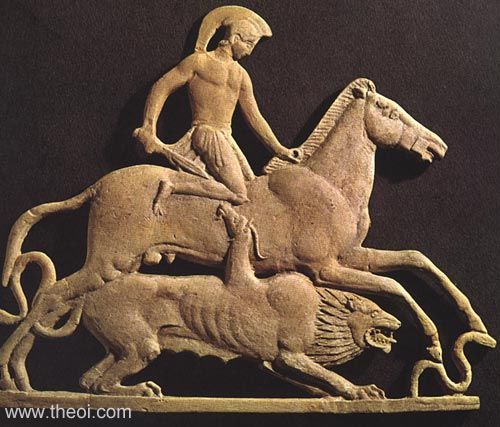
CHARACTERS
SISYPHOS (Sisyphus). An early king of Korinthos (Corinth) and grandfather of Bellerophontes who was condemned
to torments in the underworld for his crimes.
GLAUKOS (1) (Glaucus). The king of Korinthos (Corinth) whose was the cuckolded father of Bellerophontes.
GLAUKOS (2) (Glaucus). A Lykian (Lycian) prince and grandson of Bellerophontes who fought in the Trojan War.
EURYNOME. The wife of King Glaukos of Korinthos (Corinth) who was the mother of Bellerophontes by the god
Poseidon
POSEIDON. The god of the sea and father of Bellerophontes.
BELLEROPHONTES (Bellerophon). The hero-prince of Korinthos (Corinth), master of the winged-horse Pegasos and
slayer of the Khimaira (Chimera).
PEGASOS (Pegasus). A winged horse, son of Poseidon and the Gorgon Medousa (Medusa), which was the steed--and
half-brother--of Bellerophontes.
ATHENA. The patron goddess of heroes who assisted Bellerophontes during his many trials.
DELIADES. A son of King Glaukos of Korinthos who was slain by his half-brother Bellerophontes.
BELLEROS. A Korinthian killed by Bellerophontes.
AITHRA (Aethra). A princess of Troizenos (Troezen) in Argolis who was wooed by Bellerophontes and later became
the mother of Theseus.
PROITOS (Proetus). King of Argos.
STHENEBOIA (Stheneboea) or ANTEIA (Antia). The wife of King Proitos of Argos and daughter of King Iobates of
Lykia.
IOBATES. A king of Lykia (Lycia) and father-in-law of King Proitos of Argos who commanded Bellerophontes slay
the Khimaira (Chimera).
KHIMAIRA (Chimera). A three-headed, fire-breathing lion which ravaged the Lykian countryside.
AMISODAROS (Amisodarus). A Lykian man who reared the Khimaira (Chimera).
SOLYMOI (Solymi). A barbarian tribe which harried the borders of Lykia (Lycia).
AMAZONES (Amazons). A tribe of warrior women.
PHILONOE. The daughter of King Iobates of Lykia (Lycia) and wife of Bellerophontes.
PLACES
KORINTHOS (Corinth). A town on the Isthmos of the Greek Peloponnese.
EPHYRA. An old name for Korinthos.
ARGOS. A town of the Greek Peloponnese, west of Korinthos.
LYKIA (Lycia). A country on the Aegean coast of Anatolia (modern Turkey) which contained a number of Greek
colonies.
KRAGOS (Cragus). A mountain in Lykia which was the home of the Khimaira (Chimera).
CLASSICAL LITERATURE QUOTES
Homer, Iliad 6. 144 - 221 ff (trans. Lattimore) (Greek epic C8th B.C.) :
"[During a battle of the Trojan War the Greek hero Diomedes asks after the ancestory of Glaukos (Glaucus),
a Lykian ally of the Trojans :] The shining son [Glaukos] of Hippolokhos (Hippolochus) answered :
‘High-hearted [Diomedes] son of Tydeus, why ask of my generation? . . . If you wish to learn all this and
be certain of my genealogy : there are plenty of men who know it. There is a city Ephyre [Korinthos (Corinth)],
in the corner of horse-pasturing Argos; there lived Sisyphos, Aiolos' (Aeolus') son, and he had a son named
Glaukos (Glaucus), and Glaukos in turn sired Bellerophontes the blameless. To Bellerophontes the gods granted
beauty and desirable manhood; but Proitos (Proetus) in anger devised evil things against him, and drove him out
of his own domain, since he was far greater, from the Argive country Zeus had broken to the sway of his sceptre.
Beautiful Anteia the wife of Proitos was striken with passion to lie in love with him, and yet she could not
beguile valiant Bellerophones, whose will was virtuous. So she went to Proitos the king and uttered her
falsehood : "Would you be killed, o Proitos? Then murder Bellerophontes who tried to lie with me in love,
though I was unwilling." So she spoke, and anger took hold of the king at her story. He shrank from killing
him, since his heart was awed by such action, but sent him away to Lykia (Lycia), and handed him murderous
symbols, which he inscribed in a folding tablet, enough to destroy life, and told him to show it to his wife's
father, that he might perish.
‘Bellerophontes went to Lykia in the blameless convoy of the gods; when he came to the running stream of
Xanthos (Xanthus), and Lykia, the lord of wide Lykia tendered him full-hearted honour. Nine days he entertained
him with sacrifice of nine oxen, but afterwards when the rose fingers of the tenth dawn showed, then he began to
question him, and asked to be show the symbols, whatever he might be carrying from his son-in-law, Proitos. Then
after he had been given his son-in-law's wicked symbols first he sent him away with orders to kill the Khimaira
(Chimera) none might approach; a thing of immortal make, not human, lion-fronted and snake behind, a goat in the
middle, and snorting out the breath of the terrible flame of bright fire. He killed the Khimaira, obeying the
portents of the immortals.
‘Next after this he fought against the glorious Solymoi (Solymi), and this he thought was the strongest
battle with men that he entered; but third he slaughtered the Amazones (Amazons), who fight men in battle. Now
as he came back the king spun another entangling treachery; for choosing the bravest men in wide Lykia he laid a
trap, but these men never came home thereafter since all of them were killed by blameless Bellerophontes. Then
when the king knew him for the powerful stock of the god, he detained him there, and offered him the hand of his
daughter, and gave him half of all the kingly privilege. Thereto the men of Lykia cut out a piece of land,
surpassing all others, fine ploughland and orchard for him to administer.
‘His bride bore three children to valiant Bellerophontes, Isandros (Isander) and Hippolokhos (Hippolochus)
and Laodameia. Laodameia lay in love beside Zeus of the counsels and bore him godlike Sarpedon of the brazen
helmet. But after Bellerophontes was hated by all the immortals, he wandered alone about the plain of Aleios
(Aleus), eating his heart out, skulking aside from the trodden track of humanity. As for Isandros his son, Ares
the insatiate of fighting killed him in close battle against the glorious Solymoi, while Artemis of the golden
reins killed the daughter in anger. But Hippolokhos begot me [Glaukos], and I claim he is my father; he sent me
to Troy, and urged upon me repeated injunctions, to be always among the bravest, and hold my head above others,
not shaming the generation of my fathers, who were the greatest men in Ephyre and again in wide Lykia. Such is
my generation and the blood I claim to be born from.’
He spoke, and Diomedes of the great war cry was gladdened . . . and in winning words of friendliness he spoke to
the shepherd of the people : ‘See now, you are my guest friend from far in the time of our fathers.
Brilliant Oineus (Oeneus) [king of Kalydon (Calydon), grandfather of Diomedes,] once was host to Bellerophontes
the blameless, in his halls, and twenty days he detained him, and these two gave to each other fine gifts in
token of friendship. Oineus gave his guest a war belt bright with the red dye, Bellerophontes a golden and
double-handled drinking-cup, a thing I left behind in my house when I came on my journey.’"
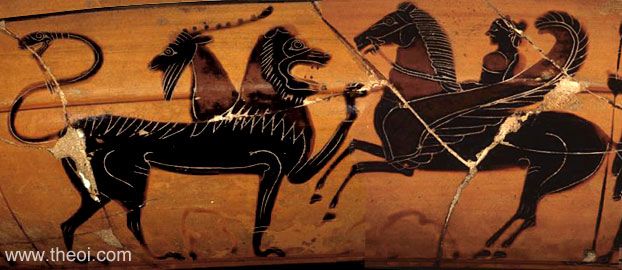
Homer, Iliad 16. 327 ff :
"Two brothers . . . Sarpedon's noble companions [in the Trojan War] and spear-throwing sons of Amisodaros,
the one who had nourished the furious Khimaira (Chimera) to be an evil to many."
Hesiod, Theogony 319 ff (trans. Evelyn-White) (Greek epic C8th or C7th B.C.)
:
"She [Ekhidna (Echidna)] was the mother of Khimaira (Chimera) who breathed raging fire, a creature fearful,
great, swift-footed and strong, who had three heads, one of a grim-eyed lion; in her hinderpart, a drakon
(dragon-serpent); and in her middle, a goat, breathing forth a fearful blast of blazing fire. Her did Pegasos
(Pegasus) and noble Bellerophontes slay."
Hesiod, Catalogues of Women Fragment 7 (from Berlin Papyri No. 7497; Oxyrhynchus
Papyri 421: 3) (trans. Evelyn-White) (Greek epic C8th or C7th B.C.) :
"Eurynome the daughter of Nisos (Nisus), Pandion's son, to whom Pallas Athene taught all her art, both wit
and wisdom too; for she was as wise as the gods. A marvellous scent rose from her silvern raiment as she moved,
and beauty was wafted from her eyes. Her, then, Glaukos (Glaucus) sought to win by Athena's advising, and he
drove oxen for her. But he knew not at all the intent of Zeus who holds the aegis. So Glaukos came seeking her
to wife with gifts; but cloud-driving Zeus, king of the deathless gods, bent his head in oath that the
((lacuna)) . . [Glaukos] son of Sisyphos (Sisyphus) should never have children born of one father. So she lay in
the arms of Poseidon and bare in the house of Glaukos blameless Bellerophontes, surpassing all men in ((lacuna))
. . over the boundless sea. And when he began to roam, his father gave him Pegasos (Pegasus) who would bear him
most swiftly on his wings, and flew unwearying everywhere over the earth, for like the gales he would course
along. With him Bellerophontes caught and slew the fire-breathing Khimaira (Chimera). And he wedded the dear
child of the great-hearted Iobates, the worshipful king . . lord (of) . . and she bare . . "
Pindar, Olympian Ode 13. 60 ff (trans. Conway) (Greek lyric C5th B.C.) :
"For when there came Glaukos (Glaucus) from Lykia (Lycia) [to join the Trojan War], the Danaans' hearts
were chill with deadly fear, hearing him boast that in Peirene's city [Korinthos (Corinth)] his own forebear
once held the soverign power, and the great heritage of kingly palace and wide patrimony : that grandsire once
strove in vain beside Peirene's spring, and suffered much, seeking to yoke the snake-haired Gorgo's (Gorgon's)
offspring, Pegasos (Pegasus). Till Pallas [Athena], goddess maid, brought him the bridle and golden headband,
and behold a dream was truth. ‘Sleep not, Aiolid king,’ said she, ‘but take this charm of
steeds, and offer the Horse-Tamer, your sire, a snow-white bull, and show to him this bridle.’
Such words, as he lay slumbering in the dark, it seemed the maiden of the shadowy aegis spoke unto him, and he
leapt to his feet and seized the magic bit, that lay beside him on the ground; and went with joy to find the
prophet of his country's people the son of Koiranos (Coeranus). And he made known to him the whole issue of this
strange matter--how that he had lain the whole night through upon the goddess' altar, as the seer had foretold
him, and how the child of Zeus whose sword is lightning, in her own hands brought him the golden charm that
tames the savage spirit. And the prophet bade him obey at once the magic vision, and to Poseidon, the
earth-holder, to sacrifice the strong-limbed bull. Then too that he should build an altar with all speed to
Athene, queen of steeds. Yet the gods' power can lightly bring to pass such things as will deny both the sworn
word and all the hopes of men. Thus with all zeal mighty Bellerophontes seized the winged steed, setting between
his jaws the soothing charm, and mounting him, in his bronze panoply played him in sport, to try his pace. And
once, with him, he smote the Amazones (Amazons), from the chill bosom of the lonely air, that archered host of
women-kind; and felled Khimaira (Chimera) breathing fire, and slew the Solymoi. His fate--'twere best unspoken.
But Pegasos dwells in the ancient stalls of Zeus upon Olympos."
Pindar, Isthmian Ode 7. 44 ff :
"Pegasos (Pegasus) winged high threw down to earth his lord Bellerophontes, who thought to reach the abodes
of heaven, and share the company of Zeus. Sweets gained unrightly await an end most bitter."
Euripides, Bellerophon & Stheneboea (lost plays) (Greek tragedy C5th B.C.)
:
The story of Bellerophontes was the theme of two lost plays by Euripides entitled Bellerophontes and
Stheneboia.
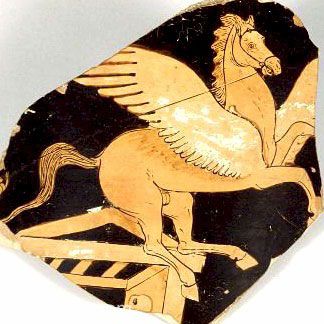
Pseudo-Apollodorus, Bibliotheca 2. 30 - 33 (trans. Aldrich) (Greek mythographer C2nd
A.D.) :
"Bellerophontes, the son of Sisyphos' son Glaukos (Glaucus), involuntarily killed his brother, whose name
was, according to various sources, Deliades or Peiren or Alkimenes (Alcimenes). So Bellerophontes came to
Proitos (Proetus) for purification. Stheneboia (Stheneboea) fell in love with him and sent him written
invitations to a romantic tryst. When he spurned her, she told Proitos that Bellerophontes had sent her messages
of the grossest nature.
Proitos believed what she told him, and gave Bellerophontes a letter to deliver to Iobates [king of Lykia
(Lycia)], in which it was written that he was to murder Bellerophontes. When Iobates read it, he ordered
Bellerophontes to slay the Khimaira (Chimera), assuming that he would instead by destroyed himself by the beast,
since not even a quantity of men could subdue it with ease, let alone one. For it was a single being that had
the force of three beasts, the front part of a lion, the tail of a dragon, and the third (middle) head was that
of a goat, through which it breathed out fire. It despoiled the countryside and ravaged the herds. It was
allegedly reared by Amisodaros, as Homer also states, and according to Hesiod its parents were Typhon and
Ekhidna (Echidna). Bellerophontes mounted Pegasos (Pegasus), his winged horse born of Medousa (Medusa) and
Poseidon, and flying high into the air brought down the Khimaira with his bow and arrows.
After this challenge, Iobates ordered him to battle the Solymoi (Solymi), and when that was done, to take on the
Amazones. When he had slain these, Iobates selected from the Lykians those most famous for their vigor, and
instructed them to murder Bellerophontes in ambush; but when Bellerophontes had slain every one of them as well,
Iobates, awestruck by his strength, showed him Proitos' letter and said he would be honoured if Bellerophontes
stayed on with him. He gave him his daughter Philonoe, and, when he died, he left him his kingdom."
Pseudo-Apollodorus, Bibliotheca 1. 85 :
“Sisyphos settled Ephyra--now called Korinthos (Corinth)--and married Merope, the daughter of Atlas. To
them was born a son Glaukos (Glaucus), who by Eurymede fathered Bellerophontes, slayer of the fire-breathing
Khimaira.”
Pseudo-Apollodorus, Bibliotheca 3. 1 :
"According to Homer, Sarpedon was a son of Zeus by Laodamia, daughter of Bellerophontes."
Theocritus, Idylls 1. 589 (trans. Rist) (Greek bucolic C3rd B.C.) :
"If you must know, we're Korinthians (Corinthians) by extraction, like Bellerophontes himself."
Parthenius, Love Romances 5 (trans.Gaselee) (Greek poet C1st B.C.) :
"From the Leontion of Hermesianax . . . Leukippos (Leucippus) the son of Xanthios, a descendant of
Bellerophontes, far outshone his contemporaries in strength and warlike valour. Consequently he was only too
well known among the Lykians (Lycians) and their neighbours."
Quintus Smyrnaeus, Fall of Troy 10. 170 ff (trans. Way) (Greek epic C4th A.D.)
:
"Bellerophontes' grave and holy place in Tlos [in Lykia (Lycia)], nigh that far-famed Khimaira's
(Chimera's) Crag."
Strabo, Geography 8. 6. 20 (trans. Jones) (Greek geographer C1st B.C. to C1st A.D.)
:
"Peirene [a spring of the city of Korinthos (Corinth)] was wont to rise over the surface and flow down the
sides of the mountain. And here, they say, Pegasos (Pegasus), a winged horse which sprang from the neck of the
Gorgon Medousa (Medusa) when her head was cut off, was caught while drinking by Bellerophontes."
Strabo, Geography 14. 3. 5 :
"Kragos (Cragus) [a coastal mountain in Lykia (Lycia)], which has eight promontories and a city of the same
name. The scene of the myth of Khimaira (Chimera) is laid in the neighborhood of these mountains. Khimaira, a
ravine extending up from the shore, is not far from them."
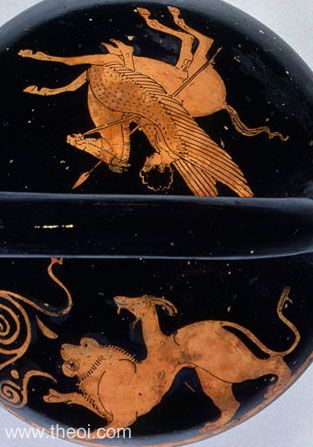
Pausanias, Description of Greece 2. 4. 1 (trans. Jones) (Greek travelogue C2nd A.D.)
:
"[In the town of Korinthos (Corinth)] is the temple of Athena Chalinitis (Bridler). For Athena, they say,
was the divinity who gave most help to Bellerophontes, and she delivered to him Pegasos (Pegasus), having
herself broken in and bridled him. The image of her is of wood, but face, hands and feet are of white marble.
That Bellerophontes was not an absolute king, but was subject to Proitos (Proetus) and the Argives is the belief
of myself and of all who have read carefully the Homeric poems. When Bellerophontes migrated to Lykia (Lycia) it
is clear that the Korinthians none the less were subject to the despots at Argos or Mykenai (Mycenae). By
themselves they provided no leader for the campaign against Troy, but shared in the expedition as part of the
forces, Mykenaian and other, led by Agamemnon.
Sisyphos had other sons besides Glaukos, the father of Bellerophontes a second was Ornytion, and besides him
there were Thersandros (Thersander) and Almos."
Pausanias, Description of Greece 2. 2. 4 :
"As one goes up to Korinthos (Corinth) are tombs . . . before the city is a grove of cypresses called
Kraneion (Craneum). Here are a precinct of Bellerophontes, a temple of Aphrodite Melainis and the grave of
Lais."
Pausanias, Description of Greece 2. 31. 9 :
"The Troizenians [in Argos] too have a fountain called the Horse's (Hippokrene), and the legend about it
does not differ from the one which prevails in Boiotia (Boeotia). For they, too, say that the earth sent up the
water when the horse Pegasos (Pegasus) struck the ground with his hoof, and that Bellerophontes came to
Troizenos (Troezen) to ask Pittheus to give him Aithra (Aethra) [mother of Theseus] to wife, but before the
marriage took place he was banished from Korinthos (Corinth)."
Pausanias, Description of Greece 2. 1. 9 :
"Among the reliefs on the base of the statue of Poseidon [at his main sanctuary on the Isthmos of Korinthos
(Corinth)] are the sons of Tyndareus, because these too are saviours of ships and of sea-faring men. The other
offerings are images of Calm and of Sea, a horse like a whale from the breast onward, Ino and Bellerophontes,
and the horse Pegasos."
Pausanias, Description of Greece 2. 3. 5 :
"The Korinthians (Corinthians) have baths in many parts of the city . . . The most famous of them is near
the Poseidon. It was made by the Spartan Eurykles (Eurycles), who beautified it with various kinds of stone,
especially the one quarried at Krokeai (Croceae) in Lakonia. On the left of the entrance stands a Poseidon, and
after him Artemis hunting. Throughout the city are many wells, for the Korinthians have a copious supply of
flowing water . . . but the most noteworthy is the one by the side of the image of Artemis. Over it is a
Bellerophontes, and the water flows through the hoof of the horse Pegasos."
Pausanias, Description of Greece 2. 27. 2 :
"On the seat [of the statue of Asklepios (Asclepius) at Epidauros] are wrought in relief the exploits of
Argive heroes, that of Bellerophontes against the Khimaira (Chimera), and Perseus, who has cut off the head of
Medousa."
Pausanias, Description of Greece 3. 18. 13 :
"[Amongst the scenes depicted on the throne of Apollon at Amyklai (Amyclae) near Sparta :] Bellerophontes
is destroying the beast in Lykia (Lycia)."
Pausanias, Description of Greece 9. 31. 3 :
"Ascending about twenty stades from this grove [of the Mousai (Muses) on Mount Helikon in Boiotia
(Boeotia)] is what is called the Horse's Fountain (Hippokrene). It was made, they say, by the horse of
Bellerophontes striking the ground with his hoof."
Diodorus Siculus, Library of History 6 Fragment 9 (trans. Oldfather) (Greek historian
C1st B.C.) :
“Bellerophontes, who was in exile because of a murder he had unwittingly committed, came to Proitos
(Proetus) who exchanged hospitality with his father; and the wife of Proitos became enamoured of Bellerophontes
because of his beauty, and since she was unable to win him by persuasion she accused him to her husband of
having offered violence to her. Now Proitos was unwilling to slay his guest, and so instead he sent him to Lykia
(Lycia), having a written message to Iobates the king, who was his father-in-law. Iobates received the letter
and discovered that in it was written that he should slay Bellerophontes with all speed; but, being unwilling to
put him to death, he commanded him instead to go join combat with the fire-breathing Khimaira (Chimera).“
Oppian, Cynegetica 1. 225 (trans. Mair) (Greek poet C3rd A.D.) :
"To Horses beyond all mortal creatures cunning Nature has given a subtle mind and heart . . . A horse
[Pegasos] carried above the clouds him [Bellerophontes] that slew the Khimaira (Chimera)."
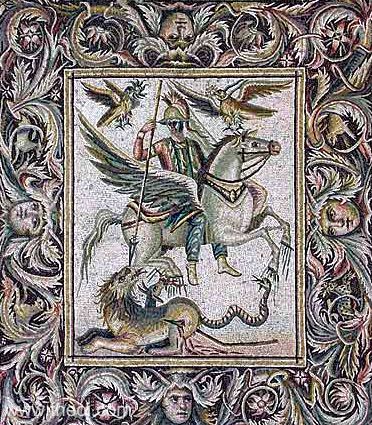
Pseudo-Hyginus, Fabulae 57 (trans. Grant) (Roman mythographer C2nd A.D.) :
"When Bellerophon had come as an exile to the court of King Proetus, Stheneboea, the King's wife, fell in
love with him. On his refusal to lie with her, she falsely told her husband she had been forced by him. But
Proetus, hearing this, wrote a letter about it, and sent him to Iobates, Stheneboea's father. After reading the
letter, Iobates was reluctant to kill such a hero, but sent him to kill the Chimaera, a three-formed creature
said to breathe forth fire. This he slew, riding on Pegasus, and he is said to have fallen in the Aleian plains
and have dislocated his hip. But the king, praising his valor, gave him his other daughter in marriage, and
Stheneboea, hearing of it, killed herself."
Pseudo-Hyginus, Fabulae 157 :
"Sons of Neptunus [Poseidon] . . . Bellerophon by Eurynome, daughter of Nysus."
Pseudo-Hyginus, Fabulae 243 :
"Women who committed suicide . . . Stheneboea, daughter of Iobas, and wife of Proetus, killed herself out
of love for Bellerophon."
Pseudo-Hyginus, Fabulae 273 :
"Those who first conduction Games . . . Eleventh, those which the Argonauts conducted . . . Bellerophon won
in the horse-race; in the four-horse chariot race, Iolaus, son of Iphicles, won over Glaucus, son of Sisyphus,
and Glaucus' snappish horses tore him apart."
Pseudo-Hyginus, Astronomica 2. 18 (trans. Grant) (Roman mythographer C2nd A.D.)
:
"[The constellation Pegasus.] This sign Aratus and many others have called Pegasus, offspring of Neptunus
[Poseidon] and the Gorgon Medusa . . .
At the time Bellerophon came to visit Proetus, son of Abas and king of the Argives, Antia, the king's wife,
smitten with love for the guest, begged to visit him, promising him her husband's kingdom. When she couldn't
obtain this request, out of fear that he would accuse her to the king, she anticipated him by telling Proetus
that he had offered violence to her. Proetus, who had been fond of Bellerophon, ws reluctant to inflict
punishment himself, but knowing that he had the horse Pegasus, sent him to the father of Antia (some call her
Sthenoboea), for him to defend his daughter's chastity and send the youth against the Chimera, which at that
time was laying waste with flames the country of the Lycians.
Bellerophon was victor, and escaped, but after the creation of the spring, as he was attempting to fly to
heaven, and had almost reached it, he became terrified looking down at the earth, and fell off and was killed.
But the horse is said to have flown up and to have been put among the constellations by Jove [Zeus].
Others have said that Bellerophon fled from Argos not because of Antia's accusations, but so as not to hear any
more proposals which were distasteful to him, or to be distressed by her entreaties."
Pseudo-Hyginus, Astronomica 2. 21 :
"The Pleiades are called seven in number . . . Merope, wed to Sisyphus, bore Glaucus, who, as many say, was
the father of Bellerophon."
Ovid, Fasti 3. 449 (trans.Boyle) (Roman poetry C1st B.C. to C1st A.D.) :
"It [Pegasus] had only just protested its strange bridling [by Bellerophon], when its light hoof dug
Aonia's spring [the Hippocrene of Mount Helicon]."
Propertius, Elegies 3. 3 (trans. Goold) (Roman elegy C1st B.C.) :
"I dreamed that lying in the soft shade of Helicon, where flows the fountain of Bellerophon's horse
[Pegasus]."
Apuleius, The Golden Ass 8. 16 ff (trans. Walsh) (Roman novel C2nd A.D.) :
"I reflected that it was panic more than anything which had induced the celebrated Pegasus to take to the
air, and that the tradition that he had wings was justified because he leapt upward as high as heaven in his
fear of being bitten by the fire-breathing Chimaera."
Nonnus, Dionysiaca 11. 142 ff (trans. Rouse) (Greek epic C5th A.D.) :
"Glaukos' (Glaucus') horses went mad and threw him out on the ground. Quickwing Pegasos threw
Bellerophontes and sent him headlong down from the sky, although he was of the seed of the Earthshaker and the
horse himself shared the kindred blood of Poseidon."
Nonnus, Dionysiaca 28. 167 ff :
"Pegasos (Pegasus) flying high in the air as swift in his course as the wandering wind, threw
Bellerophontes."
ANCIENT GREEK & ROMAN ART
SOURCES
GREEK
- Homer, The Iliad - Greek Epic C8th B.C.
- Hesiod, Theogony - Greek Epic C8th - 7th B.C.
- Hesiod, Catalogues of Women Fragments - Greek Epic C8th - 7th B.C.
- The Homeric Hymns - Greek Epic C8th - 4th B.C.
- Pindar, Odes - Greek Lyric C5th B.C.
- Apollodorus, The Library - Greek Mythography C2nd A.D.
- Theocritus, Idylls - Greek Idyllic C3rd B.C.
- Parthenius, Love Romances - Greek Mythography C1st B.C.
- Diodorus Siculus, The Library of History - Greek History C1st B.C.
- Strabo, Geography - Greek Geography C1st B.C. - C1st A.D.
- Pausanias, Description of Greece - Greek Travelogue C2nd A.D.
- Oppian, Cynegetica - Greek Poetry C3rd A.D.
- Quintus Smyrnaeus, Fall of Troy - Greek Epic C4th A.D.
- Nonnus, Dionysiaca - Greek Epic C5th A.D.
ROMAN
- Hyginus, Fabulae - Latin Mythography C2nd A.D.
- Hyginus, Astronomica - Latin Mythography C2nd A.D.
- Ovid, Fasti - Latin Poetry C1st B.C. - C1st A.D.
- Propertius, Elegies - Latin Elegy C1st B.C.
- Apuleius, The Golden Ass - Latin Novel C2nd A.D.
BIBLIOGRAPHY
A complete bibliography of the translations quoted on this page.
